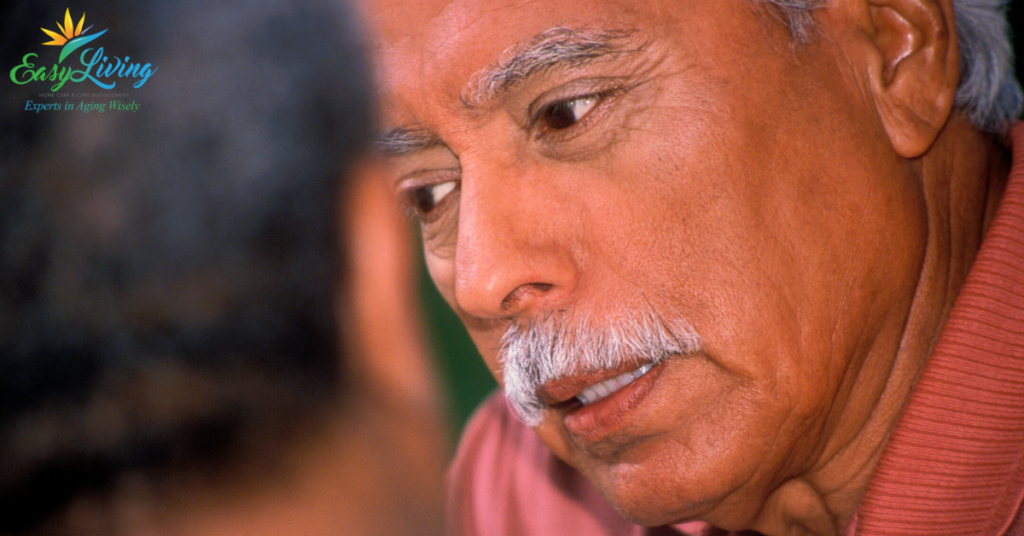The holidays can be a particularly tough time for many people. This is especially true for those who are dealing with loss. Many elders face loss and loneliness, which can be more profound during the holiday season.
Additionally, depression may worsen in winter. Beyond the seasonal effects of less sunlight and more time indoors, we tend to get less exercise and may become more isolated. The holidays often bring up worries about money and nostalgia about traditions and the past. Some elders feel frustrated or overwhelmed with activities and family obligations. Or, they may experience sadness over missing out. On top of this, indulging in too much holiday food and drink can sap our energy and health.
Therefore, this is a good time to raise the important, and often overlooked, topic of elderly mental health.
Elderly Mental Health by the Numbers
Mental illness is not a normal part of the aging process but more than 50% of older adults think it is. Almost 20% of people over the age of 55 experience mental disorders that are not part of “normal aging”. However, only about 10% of these individuals get treatment. More than six million Americans over the age of 65 are affected by depression.
The low rates seeking treatment should be a particular concern since treatment success rates can be as high as 80%.
Contributing Factors to Elderly Mental Health Issues
Stress and change
Older adults tend to experience a lot of change, from planned transitions like retirement to unexpected illnesses or deaths. Multiple stressors make a person more vulnerable to mental health problems. Loss and social isolation affect many elders and play a significant role in mental health.
Physical changes and chronic illness
Numerous physical changes affect the aging body. The brain is part of the body, so mental health and physical health are linked. Additionally, physical changes are another stressor and adaptation we have to face.
Sensory changes, particularly hearing loss and poor vision, contribute to social withdrawal and isolation. They may lead to anxiety, paranoia and depression in some older adults.
More than 80 percent of Americans 65+ experience one or more chronic health problems. People suffering from pain or chronic illness face a higher risk of mental health concerns. Diabetes may double the risk of depression. Up to a quarter of people who have a stroke experience major depression. And, up to one in three people who’ve had a heart attack experience depression which then creates elevated levels of stress hormones making it difficult for the body to recuperate.
Medications
Over 75% of older adults take a prescription medication, with many taking several. Seniors also consume the most over-the-counter medications and “nutriceuticals”. As we age, our bodies experience changes that impact the absorption and processing of medications. Some drugs may actually have the opposite effect in an older body than they do in a younger body. Beyond these effects, people may get confused taking multiple medications or skip/miss dosages. Prescription drugs, OTC medications and herbal remedies may interact dangerously. All of this can have detrimental effects on physical and mental health.
Caregiving
Though caregiving can be a rewarding experience, caregivers experience high levels of stress. Stress, loss of sleep, physical demands, poor self-care, and dealing with care recipient behaviors (especially in dementia) lead to high rates (40-70%) of caregiver depression.
Recognizing Elderly Mental Health Problems
Elderly mental health problems may not look the same as they do in younger adults. Symptoms may appear to be cognitive problems or may be more physical in nature. You may notice changes in personal care and routines (social withdrawal). Elders may seem angry or paranoid, versus being obviously sad. Older adults are also less likely to talk about or seek help for such issues.
Read our article Depression in the Elderly: Signs, Symptoms and Getting Help to understand more.
Solutions: Getting Help
If you have concerns about a loved one, even if you are not sure what the problem may be, don’t ignore it. Try to get some information from them and listen carefully. Having someone to listen empathetically and feeling less alone will help. And, it will give you a better idea of what they may be experiencing. Try to get them to get a mental health screening, whether through their primary care doctor or a specialist. Many elders will be more likely to reach out to their family doctor rather than seeking specialized mental health care. They may be more open to discussing physical symptoms, which can be a good starting point.
A care management assessment can help if you aren’t getting anywhere in these conversations. The care manager can also identify possible solutions, including ways to help reduce isolation and improve the various contributing factors. Effective mental health treatment should be holistic. It is important to address the underlying issues, such as caregiver stress, medication side effects, and physical health.
You can find additional tips for helping with depression and elderly mental health here.
Let’s talk…
We’re here to discuss your concerns and help you find the solutions you need, whether you’re worried about a loved one or having a tough time yourself.







